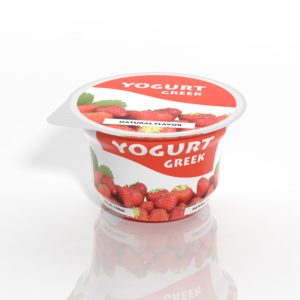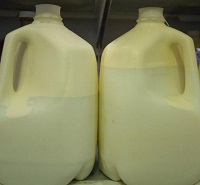Hi moms,
In part one we’ve discussed the general problem with consuming cow’s milk products, I do understand that it is hard to completely give up on dairy, so in this article I am going to give you exact instructions on how to shop for healthier dairy products at your local supermarket, health food store or directly from the farmer, so read long.
I believe that there is a healthier alternative to any food item and that is true with regards to dairy as well!
When shopping for milk products, you do have to keep four basic rules in mind:
1. Whenever buying healthier dairy choose organic over conventional milk products
Most dairy products sold in the supermarket are prepared in a conventional way, meaning milk comes from cows who were raised non ethically, milked non-stop, pumped with hormones to induce constant milk production. After the milk was extracted it goes through pasteurization, homogenization and skimming of the fat. This is the cheaper way to produce milk and ensure there is no cross contamination. This is the legal way to produce dairy products in Canada and the United States. Most children and adults are allergic or sensitive to milk products produced in this manner.
Organic milk products are processed a bit differently – organic milk must come from a cow that hasn’t been fed artificial growth hormones or pesticide-laden GMO feed. It is hard to know how the cow was treated inside the facility (most likely not too different than the conventional cow) but still the milk from a cow who hasn’t been fed hormones or GMO feed will be much better.
Wait a minute, shouldn’t cows eat only grass?
Good question! In order to get the organic certification, only 30% of the cow’s food has to come from grazing on pasture which means that 70% of the time these cows are fed grains free from GMOs. Not the best option, I agree, but still much better than the conventional option where 100% of the feed is pesticide-laden GMO in addition to the growth hormones and the unethical way cows are treated.
Another important reason why organic dairy products are superior to the conventional dairy – organic milk is much higher in omega 3 and lower in omega 6 fatty acids. The American Standard Diet is very high in omega 6 fatty acids which come from processed foods, damaged oils, conventional dairy and other lower quality foods. The more damaged omega 6 fatty acids we consume the higher the chance of getting diseases like heart disease, diabetes, cancer, depression, Alzheimer’s, rheumatoid arthritis to name a few. Organic milk has 25% less omega-6 fats and 62% more omega-3 fats than conventional milk (1).
2. The fatter the better!
Whenever you are buying healthier dairy products opt for milk products which are higher in fat content. DO NOT BUY SKIM MILK PRODUCTS!!!
Here’s why – the presence of fat is crucial in order to absorb calcium in the body in an efficient way!
By systematically removing the fat from milk products we are altering the natural composition of the milk and as a result causing more problems and health issues to our bodies and the bodies of our children. The body doesn’t know how to digest the calcium without fat present and as a result will remove calcium from the bones in order to offset the acidity accumulating from skim milk. The calcium coming from skim milk products will be peed out and not give you any health benefits!
So always look for yogurts, sour creams, butter, cream cheese, milk, etc that are organic and higher in fat! This way you will reap the benefits of the calcium in the milk.
3. Goat’s and sheep’s milk products are better than cow’s milk products
Goat’s milk is closest in chemical composition to human milk. Due to the smaller fat globules it is much easier to digest and fewer people have allergic reactions to goat’s milk relative to cow’s milk. A recent study of infants allergic to cow’s milk found that 93% of them were able to drink goat’s milk with absolutely no allergic reaction! The ease of digestibility is also due to the high amount of medium-chain fatty acids (has 35% compared to cow’s 17%). Goat’s milk also contains less lactose (milk sugars) than cow’s milk, which is great because it helps to those who suffer from lactose intolerance. Goat’s milk is slightly alkaline, unlike cow’s milk which is slightly acidic.
You can find yogurt, sour cream, cheese and milks made out of goat’s milk, and they all taste not bad at all!
Sheep milk is very creamy (meaning high in good fat) and also easier to digest, and the best part – doesn’t have a strong taste or smell like goat’s milk!
Nowadays you can easily find sheep’s milk feta cheese, sheep milk and yogurt. They are a bit pricier since it is very difficult to milk a sheep and also because they are naturally small and fragile and therefore produce a small amount of milk at a time.
One thing you still have to keep in mind, since it is illegal to sell unpasteurized milk in Canada and The United States, all goat’s and sheep’s milk products sold in conventional stores would be pasteurized, which significantly lower the quality of the milk. However, when you compare organic pasteurized cow’s milk and organic pasteurized goat’s or sheep’s milk, the last two will always be more better quality!
4. Stay away from the sweetened and fruity dairy products
I know how convenient it is to buy ready to eat yogurts which are sweetened and flavoured the way you or the kids like it. However, it’s important to understand that these products are sweetened with sugar in most cases which would spike the blood sugar levels immediately leaving you sluggish and craving for more sugar an hour later. So instead, I recommend to all my clients to buy unsweetened or plain dairy products and sweeten it at home with either raw honey, 100% pure maple syrup or any other healthy sweetener you like. This way you can control the amount of sweetness and always use less than what you are used to in order to train your taste buds for less sweet foods.

The fruit used in dairy products is usually from a concentrate and also high in sugar, food colouring and other additives, so instead add the fruit yourself at home (fresh blueberries, raspberries, bananas, pineapple, strawberries work really well).
Is raw milk good for you?
Fresh, raw, unpasteurized milk from healthy cows or goats used in small amounts is a fine food for young children. In fact, when breastfeeding is not possible, raw goat’s milk is the next best choice. Although its nutrient values are similar to those of cow’s milk, it appears to cause fewer allergic reactions and has not been homogenized or fortified.

There is a problem though – it is illegal to sell raw milk in Canada or the United States. The only way you can get raw milk is directly through a farmer in your local community (it is illegal to sell raw milk but it is not illegal to buy it, I know it sounds weird but that’s how it is). Ask “healthy moms” around, there are tons of ways to get your hands on raw milk products. Of course it is not going to be as convenient as buying milk at the grocery store, but at least you’d know that your family is consuming a much better quality food item.
Want a list of trusted organic milk brands?
I’ve created a list of my favourite brands who produce fine quality milk products, you can download it by following the link below:
Want to learn how to feed your children and never feel scared about food again?
Join me live for six weeks and learn how to apply basic nutritional principles to your daily lives, how to feed picky eaters, how to ‘healthify’ your kitchen, and stop feeling scared every time you eat or feed your child. Classes begin on May 25th, 2017. Choose from three different time slots: 10 AM, 1 PM or 8 PM EST
For more information follow this link:
https://healthbeginswithmom.com/resources/healthy-kitchen-course/
I love connecting with you!
Leave your comments below this article (feel free to write anything, let’s keep it human!). I love connecting with you 🙂